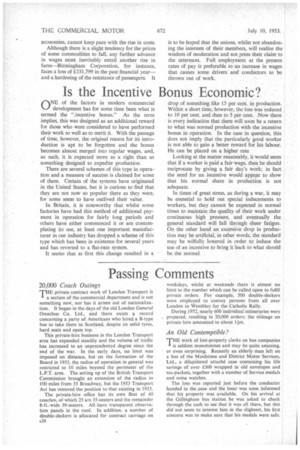Is the Incentive Bonus Economic?
Page 22

If you've noticed an error in this article please click here to report it so we can fix it.
ONE of the factors in modern commercial development has for some time been what is termed the "incentive bonus." As the term implies, this was designed as an additional reward for those who were considered to have performed their work so well as to merit it. With the passage of time, however, the original reason for its introduction is apt to be forgotten and the bonus becomes almost merged into regular wages, and, as such, it is expected more as a right than as something designed to expedite production.
There are several schemes of this type in operation and a measure of success is claimed for some of them. Certain of the systems have originated in the United States, but it is curious to find that they are not now so popular there as they were, for some seem to have outlived their value.
In Britain, it is noteworthy that whilst some factories have had this method of additional payment in operation for fairly long periods and others have either commenced it or are contemplating its use, at least one important manufacturer in our industry has dropped a scheme of this type which has been in existence for several years and has reverted to a flat-rate system.
It seems that at -first this change resulted in a drop of something like 15 per cent. in production. Within a short time, however, the loss was reduced to 10 per cent. and then to 5 per cent. Now there is every indication that there will soon be a return to what was normal production with the incentive bonus in operation. In the case in question, this does not imply that the particularly good worker is not able to gain a better reward for his labour. He can be placed on a higher rate.
Looking at the matter reasonably, it would seem that if a worker is paid a fair wage, then he should reciprocate by giving a fair day's work; in fact the need for an incentive would appear to show that his normal share in production is not adequate.
In times of great stress, as during a war, it may be essential to hold out special inducements to workers, but they cannot be expected in normal times to maintain the quality of their work under continuous high pressure, and eventually the general standard will fall through sheer fatigue. On the other hand an excessive drop in production may be artificial, in other words, the standard may be wilfully lowered in order to induce the use of an incentive to bring it back to what should be the normal.












































































